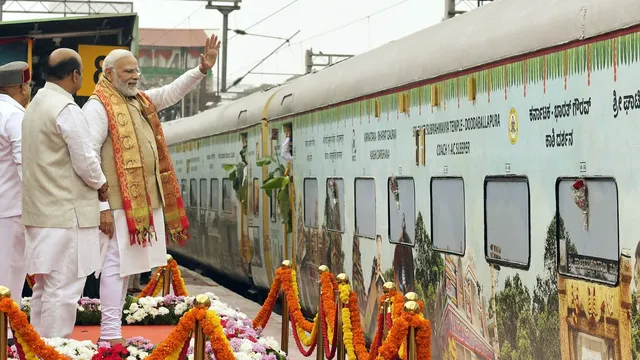- By Kamal Kumar
- Fri, 02 Aug 2024 11:23 PM (IST)
- Source:JND
Prime Minister Narendra Modi on Friday hailed the cabinet approval of eight high-speed rail corridors as a 'transformative boost' to India’s infrastructure landscape. In an X post, PM said that these projects with a budget outlay of Rs. 50,000 crore will have a multiplier effect on the economic growth of the country, and it will also boost employment opportunities.
Earlier today, the Cabinet approved eight important National High-Speed Road Corridor Projects with a total length of 936 km at a Total Cost of Rs 50,655 crore. The projects are aimed at providing high-speed transportation facilities to Indian passengers and freight carriers.
PM Modi shared an X post hailing the cabinet decision: "TRANSFORMATIVE boost to India’s infrastructure landscape! The Cabinet's approval of 8 National High-Speed Road Corridor Projects at an expenditure of over Rs. 50,000 crore will have a MULTIPLIER EFFECT on our economic GROWTH and boost EMPLOYMENT opportunities. It also underlines our commitment to a futuristic and connected India," he wrote.
These Eight High Corridors Gets Cabinet Nod
1. 6-Lane Agra - Gwalior National High-Speed Corridor
2. 4-Lane Kharagpur - Moregram National High-Speed Corridor
3. 6-Lane Tharad - Deesa - Mehsana - Ahmedabad National High-Speed Corridor
4. 4-lane Ayodhya Ring Road
5. 4-Lane Section between Pathalgaon and Gumla of Raipur-Ranchi National High-speed Corridor
6. 6-Lane Kanpur Ring Road
7. 4-Lane Northern Guwahati Bypass and Widening/Improvement of Existing Guwahati Bypass
8. 8-Lane Elevated Nashik
The execution of these projects is anticipated to create around 4.42 crore man-days of both direct and indirect employment, a government release stated.
The release stated that the government has adopted a corridor-based approach to highway infrastructure development, emphasizing consistent standards, user convenience, and logistics efficiency. This contrasts with the previous project-based approach, which primarily addressed local congestion issues.

